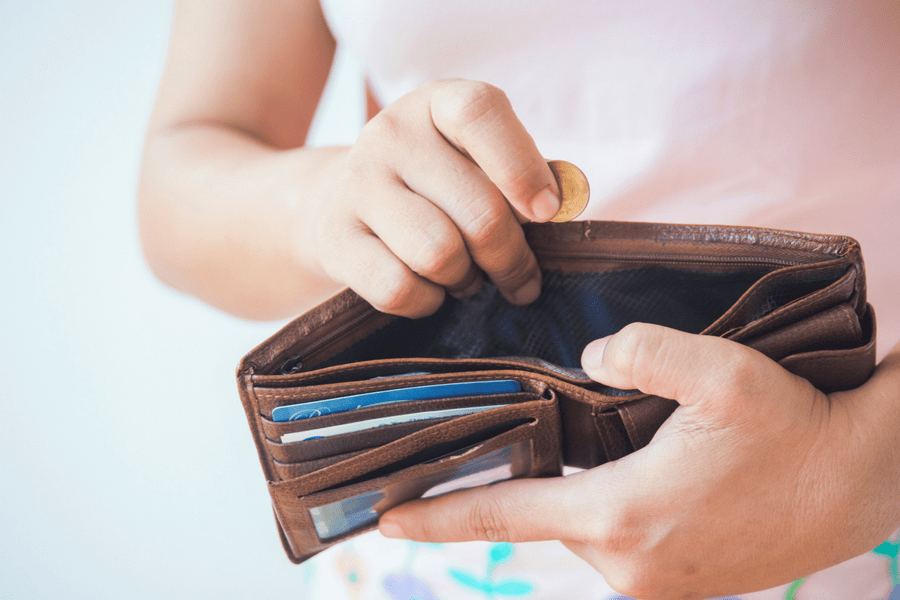How to Budget Your Money in College

One of the only things I regret about my freshman year of college — besides a few too many late nights — is that I didn’t learn how to budget from the beginning. I was so used to living at home and having my parents provide me with the essentials (like food, toilet paper, toothpaste, etc.) so I never knew how much it all actually cost. When I got to college and started having to buy all of these things for myself I was taken aback by how much I was spending each month. So I decided to start making a chart to track my monthly expenses — and while I’m not going to disclose the number, just know it was appalling.
On my second month of this little experiment I decided that something had to change so I sat down and made myself a budget. I was going to only eat out X amount of times a month and stop spending so much on cheap party clothes at Goodwill. If I’d started with a plan in mind of how much money I was willing to dish out each month I could’ve saved quite a bit and probably felt a lot better about myself.
But, now I know. And I’m sharing this story with you so that you’ll learn from my mistakes and start budgeting as soon as possible. So, here’s a broad outline of exactly how to budget your money in college and a few tips to keep in mind as you make the transition to adulthood (barf).
How to Create a Budget
Write Out Fixed Expenses
When learning how to budget, the first thing you should do is take a nice clean sheet of paper (or just make a document on your computer) and write out all the fixed expenses — aka the expenses that are always going to be there each month. Some examples of set expenses for me in particular would be rent for my apartment, gas, personal hygiene, and groceries. All of these things, no matter how hard I try, will inevitably take a nice chunk out of my paycheck each month.
It’s important to identify your fixed expenses before looking at anything else because those are things that you either aren’t willing to or can’t give up. If you do end up running over budget, you’ll have to cut from other areas.
Add Up Annual Income
Next, you should figure out how much you’ll be making each month — unless you want to configure a dollar amount each month, then you can do that too. This could be anything from babysitting you do on the weekend to a steady job you have on or off campus. For me, I have this job, which I do remotely most of the year, as well an “allowance” of sorts that I get from my parents. At this point, all you need is a figure to refer back to in a few steps; so once you get that you can move onto your discretionary expenses.
Write Out Discretionary Expenses
Discretionary expenses, for those of you who don’t know, are any other expenses that you don’t absolutely positively feel that you have to have. So, for me, these would be things like alcohol, eating out, new clothes for frat parties, and candy.
Now, if you know that you absolutely can’t live without sushi from your favorite restaurant then you should figure out how many times a month you want to eat that and add that amount into your fixed expenses. I get eyelash extensions each month, which most people would see as a discretionary expense, but I write them into the fixed column and would gladly give up other things to make room for them in my budget.
Surplus or Deficit
After coming up with those three amounts you should add the fixed and discretionary expenses together and then subtract that number from your income. If you get a surplus (or a positive number) then you’re good to go! You have extra money to save and hopefully a little more to spend on something else you’ve had your eye on.
However, if you end up with a deficit — meaning that you don’t have enough income to pay for all your expenses — then you’re going to need to take another look at your budget and start cutting back. For instance, if you end up in the negative and you had $50 for alcohol added into the budget, then maybe you decide that you don’t need to drink that much this month (just go buy a bottle of something at the liquor store; it’s cheaper).
Things to Keep in Mind
Don’t Budget Above Your Means
This is one of the biggest mistakes that people of all ages make, but especially college students. We try to go to every party each weekend or eat out with our friends three nights a week just because — which all really adds up. It’s easy to get swept up in the freedom and get yourself in debt without even realizing it. So if you take nothing else from this article just be sure that your budget never supersedes your income. If you’re not currently happy with how you’re having to budget your life, then go out there and get a job (or a better job if you already have one) and make the change happen. Money is very rarely going to fall into your lap.
Life is Full of Twists and Turns
Say your alternator breaks or you chip a tooth while trust-falling off stage at a concert and you have to front the bill. When unexpected events like these occur you need to be prepared, which is why over-budgeting is so dangerous. If you’re proactive about these chances and decide that you’re going to save or put away five to 10% of your paycheck for a “rainy day” (aka an emergency fund), you’ll find that day will come sooner than you think—and you’ll thank me when it does. I can’t predict the future, which is why I prepare for it instead—and you should too.
Work Hard for What You Really Want
Let’s say you really want a new couch for you apartment because yours smells like a mixture of sweaty feet and Burnett’s vodka (I can relate). I would recommend deciding about how much you want to spend on this new couch and adding a fraction of that price into your budget each month. Or if you’ve had your eye on a new car then save the money to be able to make that happen—and it all starts with knowing how to budget (the right way).
No matter what you’re looking to buy, it’s extremely important to start planning ahead or else it’s likely that you’re either not going to get your coveted item or you’ll be going without running water or gas money for a couple of months.
Stick to It
While the idea of a budget is really comforting to think about, it’s a bit like the thought of going to the gym five times a week: highly unlikely to happen unless you’re truly motivated. So if you start budgeting, stick with it. Your bank account will thank you and in the long run you will be much better off managing your money when you enter the “real world,” where you have to deal with things like a mortgage or even kids and literally can’t afford not to know how to budget.
Follow Anna on Instagram: @annamariedepoyster
Last modified on August 3rd, 2018










Show Comments +